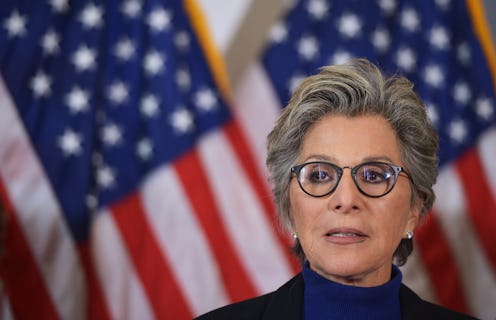News
These Politicians Want The Electoral College Gone
After Donald Trump was declared winner of the 2016 election despite earning 2.8 million votes less than Hillary Clinton, the debate surrounding our democratic system's fairness and legitimacy has been incessant. Some members of Congress are actually pushing to abolish the Electoral College. But how many United States politicians oppose this institution on the whole?
In light of their party's victory, not many Republicans have felt the need to express discontent with the status quo — in fact, some have taken to publicly defending our voting system. On Monday, as electors met in their respective state capitals to finalize the election, Arizona Sen. Jeff Flake appeared on the state's 92.3 FM’s show "Arizona’s Morning News" to explain why he's in favor of the current process. “I love it,” he said. “It emphasizes our federal system. It changes the way people campaign. We wouldn’t have candidates visit a lot of the states they visit."
Expressing a similar sentiment in favor of the controversial institution, South Dakota Sen. Mike Rounds posted a column titled "The Electoral College a Vital Piece of our Constitution" on his website.
Democrats have also been speaking out on the subject, but, as would be expected, there is more dissatisfaction and frustration to be found on this side. Here are seven of the politicians who aren't too fond of the Electoral College:
1. California Sen. Barbara Boxer
Sen. Boxer introduced a bill to abolish the Electoral College on Nov. 15. In a statement, she said:
"In my lifetime, I have seen two elections where the winner of the general election did not win the popular vote. When all the ballots are counted, Hillary Clinton will have won the popular vote by a margin that could exceed two million votes, and she is on track to have received more votes than any other presidential candidate in history except Barack Obama. This is the only office in the land where you can get more votes and still lose the presidency. The Electoral College is an outdated, undemocratic system that does not reflect our modern society, and it needs to change immediately. Every American should be guaranteed that their vote counts."
2. California Assembly Member Evan Low
It's fair to say that Low wasn't the only resident of California, an overwhelmingly democratic state, who was deeply disappointed by the election's result.
3. Polly Baca
Baca formerly served in the Colorado state Senate and is currently state chair of the Colorado Democratic Party. She's been one of the leading "Hamilton Electors" working to convince her peers to break with their designated candidate, and she has openly spoken about not agreeing with the existence of the Electoral College. "I have always believed we should have a national popular vote. That’s been my position now for decades," she said on one occasion.
4. Vermont Sen. Bernie Sanders
Sen. Sanders isn't for the complete abolishment of the Electoral College, but he does think it needs to be re-examined. "We have one candidate who had two million more votes than the other candidate but she is not going to be sworn in as president, and I think on the surface that's a little bit weird," he said on CNN's "State of the Union."
5. New York City Mayor Bill De Blasio
De Blasio, who campaigned heavily for Clinton, has shared his belief that the popular vote should have the final say more than once.
6. Massachusetts Sen. Eric Lesser
Sen. Lesser is yet another senator who's taking his fight to Congress. "Given the importance of empowering voters to believe every vote counts, the repeal of the Electoral College merits a thorough discussion," he tweeted after announcing his bill.
7. Congressman Charles Rangel
“I came to Congress on the heels of the Civil Rights Movement, and I know how hard we fought for the sacred right to vote,” said Rangel, who joined Sen. Boxer's effort. “To protect it, everyone should have access to the vote, and every vote must count. The fact that a candidate can receive more votes than the other but lose the election is fundamentally undemocratic.”
While these politicians are facing an uphill battle, the loss of two huge elections over the course of 15 years is likely to motivate Democrats more than ever before.
